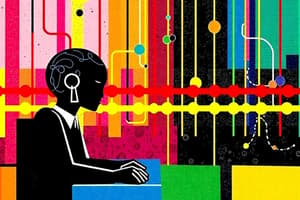Podcast
Questions and Answers
Ano ang isa sa mga kinahinatnan ng machine learning at deep learning sa late 1990s at early 2000s, base sa teksto?
Ano ang isa sa mga kinahinatnan ng machine learning at deep learning sa late 1990s at early 2000s, base sa teksto?
Ano ang inilarawan ng teksto bilang isang halimbawa ng pagpapakita ng galing ng modern computing sa pagsugpo ng mga komplikadong problema?
Ano ang inilarawan ng teksto bilang isang halimbawa ng pagpapakita ng galing ng modern computing sa pagsugpo ng mga komplikadong problema?
Ano ang naging epekto ng pagkakaroon ng mas malalakas na mga computer sa panahon ng 1980s hanggang 1990s sa larangan ng AI?
Ano ang naging epekto ng pagkakaroon ng mas malalakas na mga computer sa panahon ng 1980s hanggang 1990s sa larangan ng AI?
Ano ang teknolohiyang nagtampok ng rapidong progreso mula noong early 2010s, base sa teksto?
Ano ang teknolohiyang nagtampok ng rapidong progreso mula noong early 2010s, base sa teksto?
Signup and view all the answers
Ano ang pangunahing dahilan kung bakit patuloy na umaasenso ang AI ngayon, ayon sa teksto?
Ano ang pangunahing dahilan kung bakit patuloy na umaasenso ang AI ngayon, ayon sa teksto?
Signup and view all the answers
Study Notes
History of AI - From Turing Machines to Deep Learning
Artificial Intelligence (AI) has come a long way since its inception in the mid-20th century. This history traces the development of AI from its theoretical beginnings to its modern applications in machine learning and deep learning.
Early Concepts and Foundational Work (1940s - 1950s)
Artificial Intelligence was born from the idea of simulating human intelligence in machines. Alan Turing is often credited for conceptualizing AI in his paper "Computing Machinery and Intelligence" published in 1950. He introduced the Turing Test, a measure of computational systems' ability to exhibit intelligent behavior equivalent to, or indistinguishable from, that of a human.
In the same era, Warren McCulloch and Walter Pitts developed the first artificial neuron, laying the groundwork for neural networks. Additionally, Marvin Minsky and John McCarthy contributed significantly to early developments in AI, coining the term "artificial intelligence", and developing programming languages designed specifically for reasoning tasks.
Decline and Resurgence (1960s - 1970s)
After initial excitement, the field of AI experienced a decline in funding due to limited success in developing practical AI systems. However, the discovery of heuristic search algorithms by Herbert A. Simon and Allen Newell led to resurgence in the field. During this period, ELIZA, a computer program developed by Joseph Weizenbaum, demonstrated natural language processing capabilities through dialog simulation.
Modern Developments (1980s - 1990s)
As computers became more powerful, researchers were able to apply AI to wider domains. Neural networks, inspired by the structure of the brain, were revived and advanced during this period. Deep Blue, created by IBM, famously defeated chess grandmaster Garry Kasparov in 1997, demonstrating the power of modern computing to solve complex problems.
Emergence of Machine Learning and Deep Learning (2000s - Present)
The advent of machine learning and deep learning in the late 1990s and early 2000s revolutionized AI once again. Algorithms like Support Vector Machines and Neural Networks became increasingly sophisticated, enabling practical solutions to real-world problems.
Deep learning, a subset of machine learning based on artificial neural networks, has seen rapid progress since the early 2010s. With the introduction of convolutional neural networks (CNNs) and recurrent neural networks (RNNs), AI systems began to excel in areas previously thought beyond their scope, such as image recognition, speech synthesis, and translation.
Future Directions
Today, AI continues to advance rapidly, driven by improvements in hardware, increased data availability, and refinement of algorithms. Researchers explore topics like reinforcement learning, explainable AI, and embodied AI, pushing the boundaries of what machines can understand and do.
In conclusion, the history of AI reflects a fascinating journey from theoretical concepts to practical applications. From humble beginnings rooted in computer science, AI has evolved into a multifaceted field influencing various domains, from healthcare to climate change mitigation.
Studying That Suits You
Use AI to generate personalized quizzes and flashcards to suit your learning preferences.
Description
Isalaysay ang kasaysayan ng Artificial Intelligence (AI) mula sa panahon ng Turing Machines hanggang sa modernong aplikasyon ng machine learning at deep learning. Matuto tungkol sa mga konsepto, mga kontribusyon ng mga kilalang siyentipiko, at ang pag-unlad ng AI sa paglipas ng panahon.




